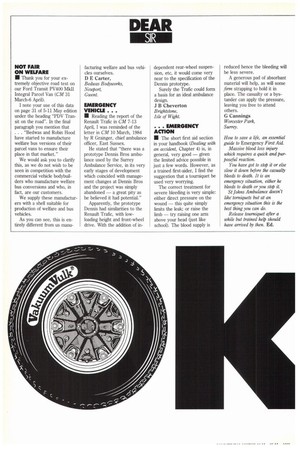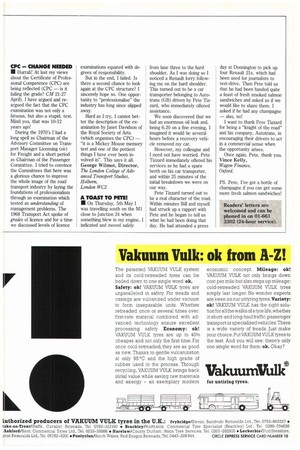DEAR
Page 40

Page 41

If you've noticed an error in this article please click here to report it so we can fix it.
SIR
NOT FAIR ON WELFARE
• Thank you for your extremely objective road test on our Ford Transit PV400 MUT Integral Parcel Van (CM 31 March-6 April).
I note your use of this data on page 31 of 5-11 May edition under the heading "PDV Transit on the road". In the final paragraph you mention that . . "Bedwas and Robin Hood have started to manufacture welfare bus versions of their parcel vans to ensure their place in that market."
We would ask you to clarify this, as we do not wish to be seen in competition with the commercial vehicle bodybuilders who manufacture welfare bus conversions and who, in fact, are our customers.
We supply these manufacturers with a shell suitable for production of welfare and bus vehicles.
As you can see, this is entirely different from us manu facturing welfare and bus vehi cles ourselves.
D E Carter, Bedwas Bodyworks, Newport, Gwent.
EMERGENCY VEHICLE . . .
• Reading the report of the Renault Trafic in CM 7-13 April, I was reminded of the letter in CM 10 March, 1984 by R Grainger, chief ambulance officer, East Sussex.
He stated that "there was a prototype Dennis Bros ambulance used by the Surrey Ambulance Service, in its very early stages of development which coincided with management changes at Dennis Bros and the project was simply abandoned — a great pity as he believed it had potential."
Apparently, the prototype Dennis had similarities to the Renault Trafic, with lowloading height and front-wheel drive. With the addition of in dependent rear-wheel suspension, etc, it would come very near to the specification of the Dennis prototype.
Surely the Trafic could form a basis for an ideal ambulance design.
B Cheverton Bnghtstone, Isle of Wight.
. . . EMERGENCY ACTION
• 'Ile short first aid section in your handbook (Dealing with an accident, Chapter 4) is, in general, very good — given the limited advice possible in just a few words. However, as a trained first-aider, [find the suggestion that a tourniquet be used very worrying.
The correct treatment for severe bleeding is very simple: either direct pressure on the wound — this quite simply limits the leak; or raise the limb — try raising one arm above your head (just like school). The blood supply is reduced hence the bleeding will be less severe.
A generous pad of absorbant material will help, as will some firm strapping to hold it in place. The casualty or a bystander can apply the pressure, leaving you free to attend others.
G Cannings Worcester Park, Surrey.
How to save a life, an essential guide to Emergency First Aid.
Massive blood loss injury which requires a quick and purposeful reaction.
You have got to stop it or else slow it down before the casualty bleeds to death. It is an emergency situation, either he bleeds to death or you stop it.
St Johns Ambulance doesn't liketorniquets but at an emergency situation this is the best thing you can do.
Release tourniquet after a while but trained help should have arrived by then. Ed. CPC — CHANGE NEEDED 11 Hurrah! At last my views about the Certificate of Professional Competence (CPC) are being reflected (CPC — is it failing the grade? CM 21-27 April). I have argued and reargued the fact that the CPC examination was not only a fatuous, but also a stupid, test. Mind you, that was 10-12 years ago!
During the 1970's I had a long spell as Chairman of the Advisory Committee on Transport Manager Licensing (sic) for Freight and a short period as Chairman of the Passenger Committee. I tried to convince the Committees that here was a glorious chance to improve the whole image of the road transport industry by laying the foundations of professionalism through an examination which tested an understanding of management problems. The 1968 Transport Act spoke of grades of licence and for a time we discussed levels of licence
examinations equated with degrees of responsibility.
But in the end, I failed. Is there a second chance to look again at the CPC structure? I sincerely hope so. One opportunity to "professionalise" the industry has long since slipped away.
Hard as I try, I cannot better the description of the examination by Janet Davidson of the Royal Society of Arts (which organises the CPC) — it is a Mickey Mouse memory test and one of the pottiest things [have ever been involved in". This says it all. George Wilmot, Director, The London College of Advanced Transport Studies, Holborn, London WC2 A TOAST TO PETE!
• On Thursday, 5th May I was travelling south on the MI close to Junction 24 when something blew in my engine, I indicated and moved safely from lane three to the hard shoulder. As I was doing so I noticed a Renault lorry following me on the hard shoulder. This turned out to be a car transporter belonging to Autotrans (GB) driven by Pete Tizzard, who immediately offered assistance.
We soon discovered that we had an enormous oil leak and, being 6.20 on a fine evening, I imagined it would be several hours before a recovery vehicle removed my car.
However, my colleague and I need not have worried. Pete Tizzard immediately offered his services as he had a spare berth on his car transporter, and within 25 minutes of the initial breakdown we were on our way.
Pete Tizzard turned out to be a real character of the road. Within minutes Bill and myself had struck up a rapport with Pete and he began to tell us what he had been doing that day. He had attended a press day at Donnington to pick up four Renault 21s, which had been used for journalists to test-drive. Then Pete told us that he had been handed quite a feast of fresh smoked salmon sandwiches and asked us if we would like to share them. I asked if he had any champagne — alas, no!
I want to thank Pete Tizzard for being a "knight of the road" and his company, Autotrans, in encouraging their drivers to act in a commercial sense when the opportunity arises.
Once again, Pete, thank you. Vince Kelly, Wagon Finance, Oxford.
PS. Pete, I've got a bottle of champagne if you can get some more fresh salmon sandwiches!


























































































































































